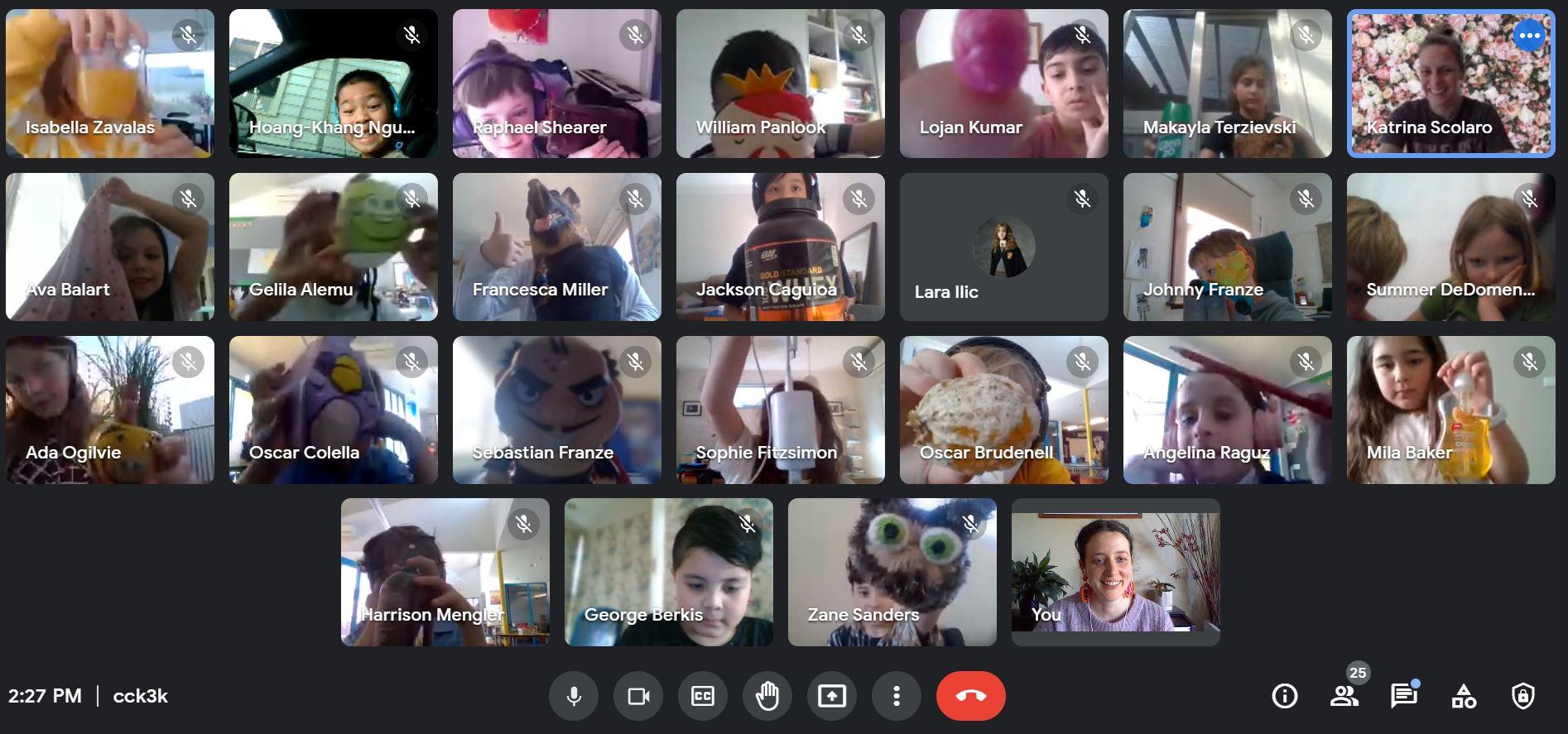Student Well-being

Community Spotlight: Year 3/4 Community
In our Year 3/4 Community, we have been mixing things up with our Wacky Wednesdays. A highlight was our Posh and Fancy Wednesday. Some of us spoke with a posh accent, dressed up in our finest outfits, or decorated our dinner table like a fancy restaurant.
We have also been looking at ways to keep our minds and bodies active during the lockdown. We have shared some of the fun experiences we have created at home, such as building forts, family storytime, and sidewalk chalk drawings. To help us remember all these fun and interesting activities we decided to make a padlet to share our ideas. We have thought of so many things we can do at home!
Make a song using chrome music lab - Lojan
You can make your own board game or challenge and play it after it is done! - Summer
Check out the 3/4 Padlet with lots of awesome ideas!
https://padlet.com/sbruce16/xqltqzj4swp8lx98
Our live Google Meets have been filled with fun and laughter. One of our favourite activities to do is a Kahoot! Quiz. Even if we don't place, we still have a lot of fun cheering each other on. Some other highlights so far have been, show and tell, talent shows, Would You Rather questions and dance-offs.
R U OK? Day
R U OK? Day (Thursday 9 September) is our national day of action dedicated to reminding everyone that any day is the day to ask, “Are you OK?” and support those struggling with life.
This year's message is:
Are they really OK? Ask them today.
Getting ready to ask:
Before you can look out for others, you need to look out for yourself. And that’s ok. If you're not in the right headspace or you don't think you're the right person to have the conversation, try to think of someone else in their support network who could talk to them.
To help you decide whether you’re ready to start a meaningful conversation, ask yourself:
Am I ready?
- Am I in a good headspace?
- Am I willing to genuinely listen?
- Can I give as much time as needed?
Am I prepared?
- Do I understand that if I ask how someone’s going, the answer could be: “No, I’m not”?
- Do I understand that you can’t ‘fix’ someone’s problems?
Do I accept that they might not be ready to talk? Or they might not want to talk to me?
Picked my moment?
- Have I chosen somewhere relatively private and comfy?
- Have I figured out a time that will be good for them to chat?
- Have I made sure I have enough time to chat properly?
How to ask:
R U OK? has developed four conversation steps to give you the skills and confidence to navigate a conversation with someone you're worried about.
1. Ask Be relaxed, friendly and concerned in your approach.
- Help them open up by asking questions like "How are you going?" or "What’s been happening?"
- Mention specific things that have made you concerned for them, like "You seem less chatty than usual. How are you going?"
IF
- If they don’t want to talk, don’t criticise them.
- Tell them you’re still concerned about changes in their behaviour and you care about them.
- Avoid a confrontation.
- You could say: “Please call me if you ever want to chat” or “Is there someone else you’d rather talk to?”
2. Listen with an open mind
- Take what they say seriously and don't interrupt or rush the conversation.
- Don’t judge their experiences or reactions but acknowledge that things seem tough for them.
- If they need time to think, sit patiently with the silence.
- Encourage them to explain: "How are you feeling about that?" or "How long have you felt that way?"
- Show that you've listened by repeating back what you’ve heard (in your own words) and ask if you have understood them properly.
3. Encourage action
- Ask: “What have you done in the past to manage similar situations?”
- Ask: “How would you like me to support you?"
- Ask: “What’s something you can do for yourself right now? Something that’s enjoyable or relaxing?”
- You could say: "When I was going through a difficult time, I tried this... You might find it useful too."
- If they've been feeling really down for more than 2 weeks, encourage them to see a health professional. You could say, "It might be useful to link in with someone who can support you. I'm happy to assist you to find the right person to talk to.”
- Be positive about the role of professionals in getting through tough times.
IF THEY NEED EXPERT HELP
Some conversations are too big for family and friends to take on alone. If someone’s been really low for more than 2 weeks - or is at risk - please contact a professional as soon as you can.
For more information, please visit https://www.ruok.org.au/
4. Check-in
- Pop a reminder in your diary to call them in a couple of weeks. If they're really struggling, follow up with them sooner.
- You could say: "I've been thinking of you and wanted to know how you've been going since we last chatted."
- Ask if they've found a better way to manage the situation. If they haven't done anything, don't judge them. They might just need someone to listen to them for the moment.
- Stay in touch and be there for them. Genuine care and concern can make a real difference.
Take care and stay safe,
Lauren Borg
Student Well-being Leader




